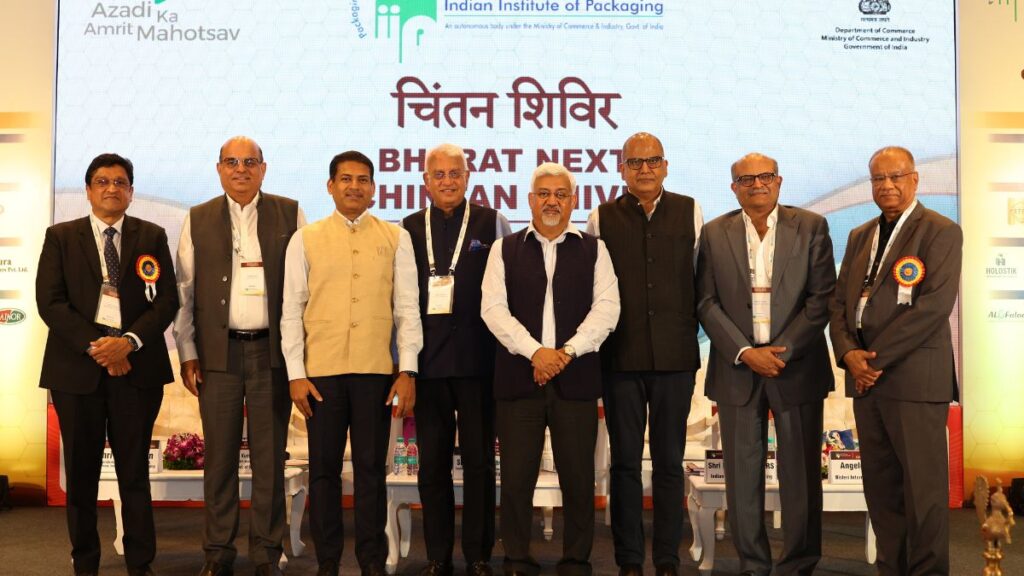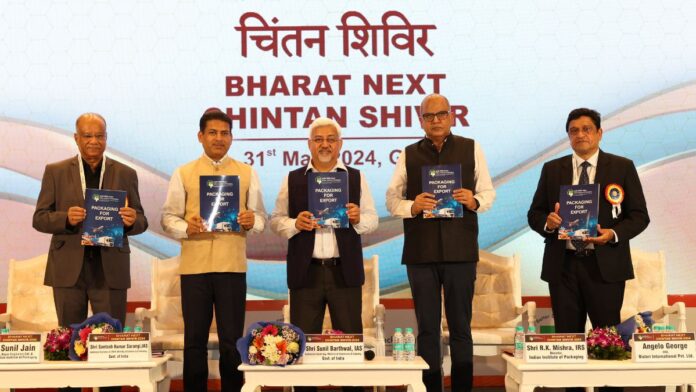The Indian Institute of Packaging (IIP), under the aegis of the Department of Commerce, Ministry of Commerce and Industry, Government of India, hosted a successful one-day Chintan Shivir programme in Goa on 31st May, 2024. The event saw the participation of key stakeholders from the packaging material and machinery manufacturing sectors, user industries, brands, academicians, IIP staff, alumni and students. The programme featured four insightful sessions addressing the current state and future directions of the IIP in shaping up the packing sector in India.
The Chief Guest for the event, Shri Sunil Barthwal, IAS, Commerce Secretary, and the Guest of Honour, Shri Santosh Kumar Sarangi, IAS, Additional Secretary, delivered key addresses highlighting the importance of innovative packaging solutions and sustainable practices.
Shri Santosh Kumar Sarangi emphasized the critical role of innovative packaging systems in reducing food waste and post-harvest losses, which are essential for maintaining India’s export surplus. He stressed the importance of domestic R&D in packaging to support the “Atmanirbhar Bharat” initiative and the need for consumer awareness regarding sustainable packaging options. Shri Sarangi called for collaboration among government, industry and academia to create a skilled workforce and foster a thriving food ecosystem with minimal waste.
In his keynote address, Shri Sunil Barthwal outlined the future growth prospects of India’s packaging industry. He identified several key focus areas including enhancing product appeal and functionality, efficient containerization for global reach, sustainable packaging solutions, and addressing the needs of the booming e-commerce sector. Shri Barthwal also underscored the importance of standardizing packaging practices across India and the role of Government in supporting R&D and infrastructure development.
Mr. Angelo George, CEO, Bisleri International shared his journey of the packaging water industry in promoting sustainability packaging. He spoke about how plastic bashing is actually counter-productive to sustainability and how a detailed endocrinological study with CFTRI and PACE India has scientifically proven that PET is 100% safe for water, beverages and food etc. Inspite of this, people have a wrong impression that all plastics is bad. He spoke about how we need to focus on circularity and also need to improve civic sense and respect for garbage disposal.
The first session highlighted the strategic importance of the Indian Institute of Packaging as a cornerstone for industrial innovation. Discussions focused on building robust infrastructure, sharing knowledge through research and industry collaboration, fostering incubation centers, and promoting sustainable packaging. The Government’s commitment to R&D and planned investments were seen as significant steps going forward.
The second session explored technological advancements such as AI, ML, robotics, and automation in packaging manufacturing. It also emphasized material development through collaborations with agencies like DRDO and ISRO, and the importance of a strong startup
ecosystem. The session stressed the need for developing a skilled workforce through industry-integrated training programs.
The third session discussed IIP’s educational initiatives, including various undergraduate and postgraduate programs, short-term courses and workshops. The session also focused on issues related to faculty development, curriculum revamps, industry collaboration and establishing a strong research focus through PhD programs and incubation centers.
The final session addressed the role of IIP in promoting sustainable packaging solutions. Discussions included supporting community food businesses through collaborative packaging design and development programs, mentoring on marketing through packaging, and forming sustainability committees to focus on material innovation and life cycle analysis. The session also emphasized integrating sustainability into the IIP curriculum and engaging students in community outreach projects.

Key Takeaways
- Innovation and R&D: A strong focus on domestic R&D in packaging to support the “Atmanirbhar Bharat” initiative and reduce dependency on imports.
- Sustainability: Emphasis on developing sustainable packaging solutions, including returnable, reusable, recyclable, and biodegradable options.
- Collaboration: Enhanced collaboration between Government, industry, academia, and startups to drive innovation and address industry challenges.
- Education and Training: Expanding educational programs at IIP to develop a skilled workforce, including new undergraduate and postgraduate programs, short-term courses, and faculty development initiatives.
- Global Reach: Efforts to align with international packaging standards and regulations to boost global competitiveness.
- Technological Advancements: Adoption of AI, ML, robotics, and automation to improve manufacturing processes and material development.
- Community Support: Initiatives to support community food businesses through packaging design, marketing mentorship, and sustainability education.
- Infrastructure Development: Significant investment in infrastructure development at IIP laboratories to support advanced research and testing.
- Employment: Hiring of faculty and skilled manpower to support expanded educational and research initiatives.
- Pilot Manufacturing Plant: Establishment of a pilot manufacturing plant to facilitate practical training and industry collaboration.
- Incubation Centre: Setting up incubation centers to support startups and foster innovation in the packaging industry.
- Knowledge Centre: Development of a knowledge centre to create and disseminate information, research findings, and industry insights.
The Chintan Shivir programme marked a significant step forward in shaping the future of India’s packaging industry, with comprehensive discussions and actionable outcomes aimed at propelling the sector to new heights by 2047.












